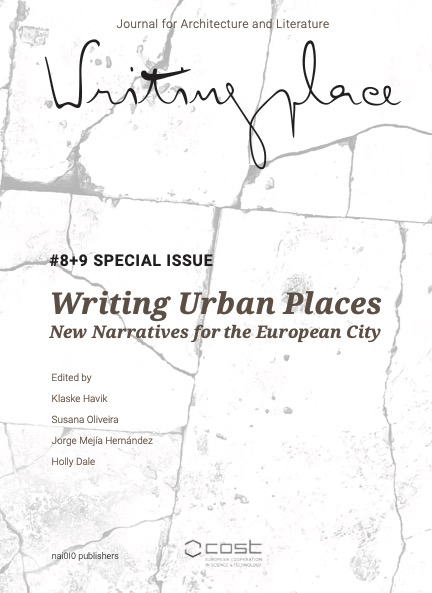Unearthing Urban Narratives. Towards a Repository of Methods
Working Group 3
DOI:
https://doi.org/10.7480/writingplace.8-9.7251Abstract
Urban narratives offer a situated, experiential and subjective window into urban places. They come in spoken, visual and written forms and can be queried through a variety of approaches and methods. This contribution draws on the work of WG3–Methodological Framework of the COST Action–Writing Urban Places and reflects on the quest to find and bring together different methods and approaches to unearth, understand and retell urban narratives.
We begin this essay by contextualizing the growing interest in narratives within the multidisciplinary field of urban studies and acknowledging the need for methods and approaches to find, analyse, represent and construct such narratives. Following this introduction, we briefly describe the task of WG3 and broadly present the range of methods that were collected as well as the interesting outputs that were produced, including a special issue in a journal, an interactive and iterative online platform, an international digital conference, a book with around 50 methods and assignments, and a set of postcards to disseminate them.
Subsequently, we reflect on this process and discuss the way in which: it helped visualize the often hidden spaces/sites/places where narratives can be found; it unsettled our understanding of what constitutes an urban narrative as well as a method and what these methods are for; and it illustrated the potential of narratives as a medium not only to unlock and generate situated, subjective and experiential knowledge about urban places, but also to mobilize ideas that may even shape urban futures.
References
Lieven Ameel, The Narrative Turn in Urban Planning: Plotting the Helsinki Waterfront (Oxfordshire: Routledge, 2021).
Lieven Ameel, Jens Martin Gurr and Barbara Buchenau, Narrative in Urban Planning: A Practical Field Guide (Bielefeld: Transcript Independent Academic Publishing, 2023).
Roland Barthes, ‘The Death of the Author’, Aspen 5/6 (1967).
Benedetto Croce, ‘La storia ridotta sotto il concetto generale dell’arte’, in: Benedetto Croce, Primi saggi (Bari: Laterza, 1951).
Jacques Derrida, De la grammatologie (Paris: Les Éditions de Minuit, 1967).
Umberto Eco, La Struttura Assente. La Ricerca Semiotica e il Metodo Strutturale (Milan: Bompiani, 1972).
Michel Foucault, Modernity and its Discontents (1969).
Clifford Geertz, The Interpretation of Cultures: Selected Essays by Clifford Geertz (New York: Basic Books, 1973).
Jeong-Hee Kim, Understanding Narrative Inquiry: The Crafting and Analysis of Stories as Research (Thousand Oaks: Sage Publications, 2016).
Catherine Kohler Riessman, Narrative Methods for the Human Sciences (Thousand Oaks: Sage Publications, 2008).
Carlos Machado e Moura et al. (eds.), Repository: 49 Methods and Assignments for Writing Urban Places (Rotterdam: nai010 publishers, 2023).
Lorin Niculae et al. (eds.), ‘Narrative Methods for Writing Urban Places’, Writingplace: Journal for Architecture and Literature 5 (2021).
Marie-Laure Ryan, Kenneth Foote and Maoz Azaryahu, Narrating Space/Spatializing Narrative: Where Narrative Theory and Geography Meet (Columbus: Ohio State University Press, 2016).
Eyal Weizman, Forensic Architecture: Violence at the Threshold of Detectability (Cambridge, MA: MIT Press, 2017).
Mark Wigley, ‘Story-Time’, Assemblage 27 (1995), 83.
Jo Woodiwiss, Kate Smith and Kelly Lockwood (eds.), Feminist Narrative Research (London: Palgrave Macmillan, 2017).
Downloads
Published
How to Cite
Issue
Section
License
Copyright (c) 2023 Dalia Milián Bernal, Carlos Machado e Moura

This work is licensed under a Creative Commons Attribution 4.0 International License.



